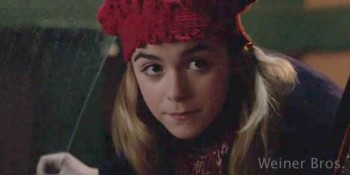For the first time in seven years, a black character was given a substantial plot and character development on this week’s episode of Mad Men. In fact, Dawn and Shirley even spoke to each other, allowing the show to finally satisfy the Black-del test.
I find it appropriate that Dawn was so central to this week’s outing because the episode was all about the dawning of new days for our heroes. “A Day’s Work” brings into relief the transitions of several characters from one stage of their lives to another. Don is, of course, attempting to transition from the role we’ve seen him in for six years into a more even-tempered, sober, loving man. He is being critically aided in that journey by his daughter’s own evolution.
Sally is outside the oppressive bubble of Betty Francis. The complexities and nuances of life are beginning to register for her. She has been forced to confront death. (Remember she was shielded from her grandfather’s several years ago, and Don still doesn’t want her attending funerals.) She has seen adultery and robbery firsthand. The relationships Sally must navigate with Glen Bishop and with her classmates at boarding school are introducing her to the politics of life her father has mastered so well. She has edged her way under the tent flap and has a sense of how hard it is to be a grown-up. She can finally empathize with her father. She can finally love him instead of resent him.
Unfortunately, we are seeing a new dawn for Peggy Olson as well, and it’s not looking like it’s going to be filled with sunshine. Peggy demonstrated a disappointing, infuriating self-centered-ness in this episode. She could not even conceive of the notion that her secretary might be receiving flowers on Valentine’s Day. She could not see the lengths to which Shirley went to avoid hurting Peggy’s feelings. And when the truth was revealed, Peggy reacted like a spoiled child, completely disregarding Shirley and turning the situation into a poor-Peggy moment. I felt anything but “poor Peggy.” Ted’s jilting and L… what’s his name? Lyle? Lucky? Oh, Lou! — Lou’s suffocation have driven Peggy into Draper-like egotistical fits.
I think, ironically, it is Don who will set Peggy on track to success as a passionate but stable creative director and junior partner by series’ end. Peggy might also loosen up when she finally gets laid by either Stan or Ginsberg.
There were other transitions, too: Dawn to office manager, Joan to account “man,” Roger to professional (if not personal) impotency. I’m not sure where Pete’s headed, but it may just be the loony bin.
What was not a transition or out of place was Bert Cooper’s racism. I mean, keep in mind that if Cooper is as old as Robert Morse, the man was born in 1886 during the Cleveland administration. The first Cleveland administration!
I do believe Joan or another partner should have stepped in during the “rearranging” for the sake of enlightening Mr. Cooper and positioning SC&P for the new reality of 1969 and the decade to come, but I suspect that little speck of discrimination was simply a plot concession to move Joan around the chessboard toward the ever-approaching endgame.
